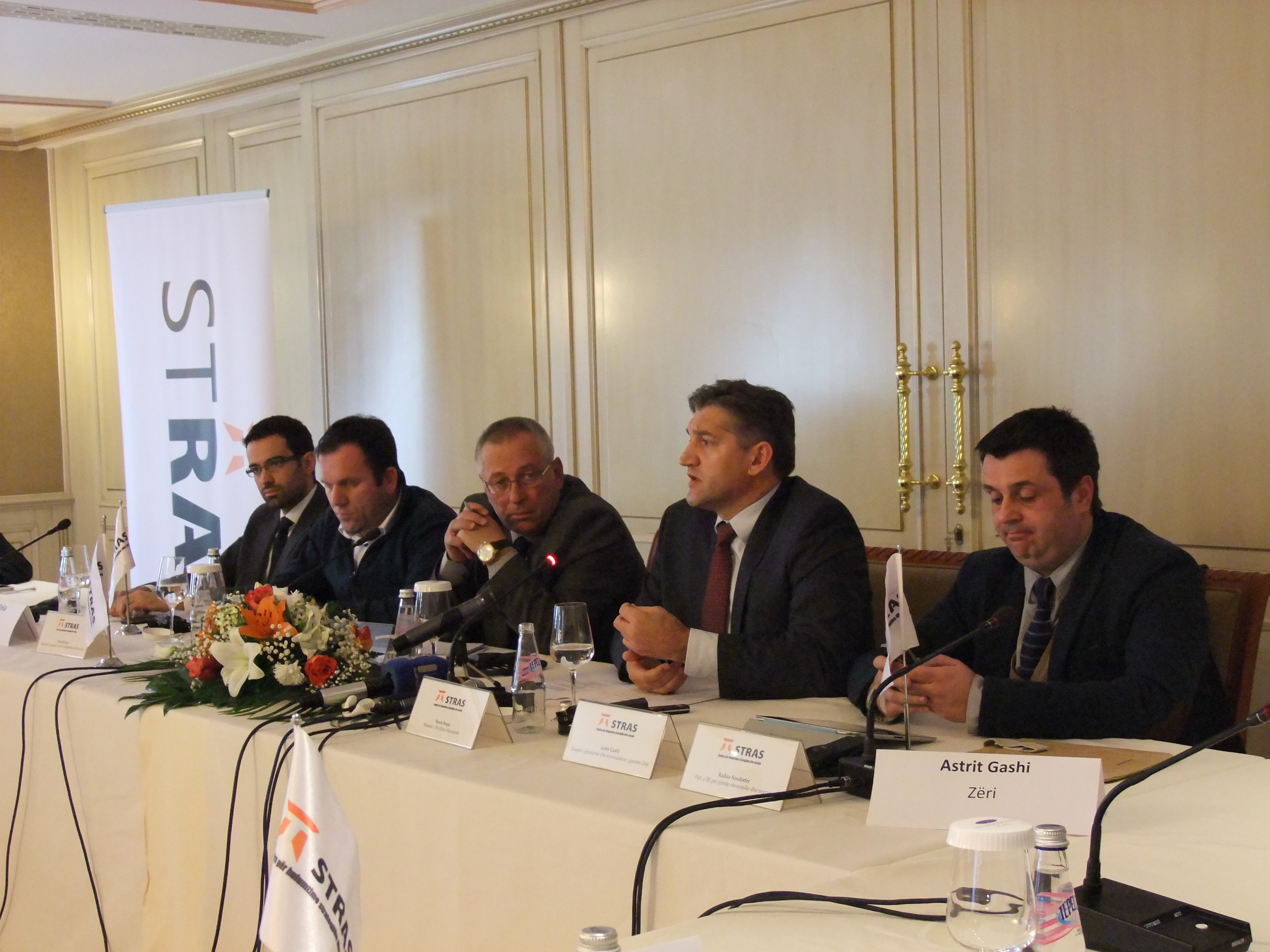Beqaj: The role of the state in economic development is to create the legislation and legal infrastructure
Prishtina, 12 November 2012 – Besim Beqaj, Minister of Economic Development, said today that the role of the state in economic development is to adopt legislation and legal infrastructure.
Participating in a conference dedicated to the heavy industry, organized by the American Chamber of Commerce in Kosovo and STRASS, Minister Beqaj said that this issue should be divided in two phases; firstly to speak on the role of the state, regulatory parameters, legislative parameters, long-term orientations, and secondly, on the role of economy, role of the market, which defines how long one can a market player.
“In this context, the Government of the Republic of Kosovo has a clear vision. I understand that in principle, that from the previous system, we are used to having development strategies in hundreds of pages, which in 90% of content are incomprehensible to the reader, without clear deadlines, or measuring mechanisms. We have drafted a document which includes deadlines, measurement indicators, with concrete actions, with clear instructions on institutions responsible to undertake actions; and this all constitutes our vision.
Kosovo’s economic development vision is to ensure a functional sector, competitive domestically and internationally, to have a legal basis which advantageous for the development of the industry, to have a supporting infrastructure, and to see the Government completely withdrawn from the business”, said Minister Beqaj.
He said that these are philosophical development orientations which we should address, becuae many countries in the world have developed themselves in this context.
“They were not developed through the provision of subsidies, they were not developed by supporting and establishing socially owned enterprises; hence, I want to say to everyone who wish to speak about Kosovo’s economic development vision and strategy that I am willing to organize another debate and discuss in detail, rather than only reaching superficial conclusions”.
Minister Beqaj said the role of heavy industry plays a vital role, and that a concrete action to be undertaken will be the drafting of a strategy on the development of this sector until 2025.
“I would be very pleased if one of you who has read the strategy to speak on a few elements of this strategy, whether it is good or bad, or where there are gaps in the strategy. This is a strategy drafted by a larger group of experts of the area; it is not strategy developed by MED, but rather people of science, universities, people who presently work in these companies”.
This strategy, according to Minister Beqaj, has three key objectives: the main principle is to fill in the gap in education, as we have had a detachment with the industry, and this is an objective we have to achieve. Another element is the revitalization and construction of processing capacities – not the exploitation and trading of ores, but establishment of production and processing capacities, which will enhance the economic value of exports per unit.
“For this purpose, there is an action plan which we have to analyze individually, and it provides that the Ministry and all experts are working with this action plan, which outlines annual actions”.
The third element is environment protection, in terms of mining activities, as there are many developments for which no reclamation has been carried out, we have industries which have extracted a part of the raw materials, and due to their technologies they were unable to complete the extraction process.
As a result of this strategy, a series of other documents have been drafted and approved, such as the Law on Mining Remains, Law on Mines and Minerals, which should be amended to include a clear orientation on the treatment and use of our resources, not only to burn coal, but also for chemical industry, and processing.
“When speaking on Ferronikel, Trepça, Sharrcem, I don’t want to go in too many details, because the data presented here are only superficial; they are telegraphic data which can be collected in 10 minutes and do not provide sufficient material to debate their essential problems. There is strategy for this as well. “The issue of Trepça has been misused by many various.”
“I tell you that the Government of Kosovo has introduced laws which address the issue of Trepça, including a special Law on Enterprises of Special National Interest, Law on the Privatization Agency of Kosovo, and the Law on the Special Chamber of the Supreme Court on Privatization related Matters. No institution ever addressed Trepça’s privatization models”.
Kosovo’s economic orientation model has been selected, said Minister Beqaj, and added that this Government is determined to ensure a market economy, an economy that shall respect the possibility to enhance the competitive value of enterprises.
“Its content also determines that the business shall be conducted by the private sector, that the government shall be involved as little as possible in business. As a result of this, with the aim of consulting with the businesses, we have established a National Commission on Economic Development, which holds regular monthly meetings, and consists of competent people, including from three chambers of commerce (CCK, AmCham, BAK)”.
One cannot say that the Government is setting up an economic development concept without consultations with the business community, when there are monthly mandatory meetings addressing all issues individually, addressing ideas for decision-making, as well as the effects of laws, said Minister Beqaj.
Economic Development Minister added that he requested in the Energy Ministers’ Meeting in Budva, Montenegro, that the final recommendations include the proposal that the civil society is consulted for all projects; however, there is reluctance, not just in Kosovo but in other countries of the world as well, for the civil society to be part of decision-making.
“For decision-making, one must go through an election process, but certainly, the media, professional people, scientist, namely all of the civil society, are welcome to discuss on any pending issue. Namely, not only to take the role of an advocate, saying this went wrong and ghis went worse. I agree that there are many negative, things and that Kosovo must improve, but must also speak on the other side of the coin, to speak on what WB is appraising that with the exception of Kosovo all countries will enter into a recession. Economic growth occurring in Kosovo can only be dreamed by other countries”, said Minister Beqaj.
“Which government in the region invests 40 percent of its budget in capital investments? We have a very strong micro-financial stability and surely, we have guided them through our laws and strategies. Only this year, MED has signed over 80 million Euros of investments in publicly owned enterprises from donors and the local and central budgets, including the Prishtina Regional Water Supply Company, Water Processing Plant in Prizren, Gjakova, and a series of projects you can all come and see”.
Finally, he added that he is open to discuss in a professional, well-argued, and factual manner with each individual, and confront opinions on any issue related to the country’s economic development.

